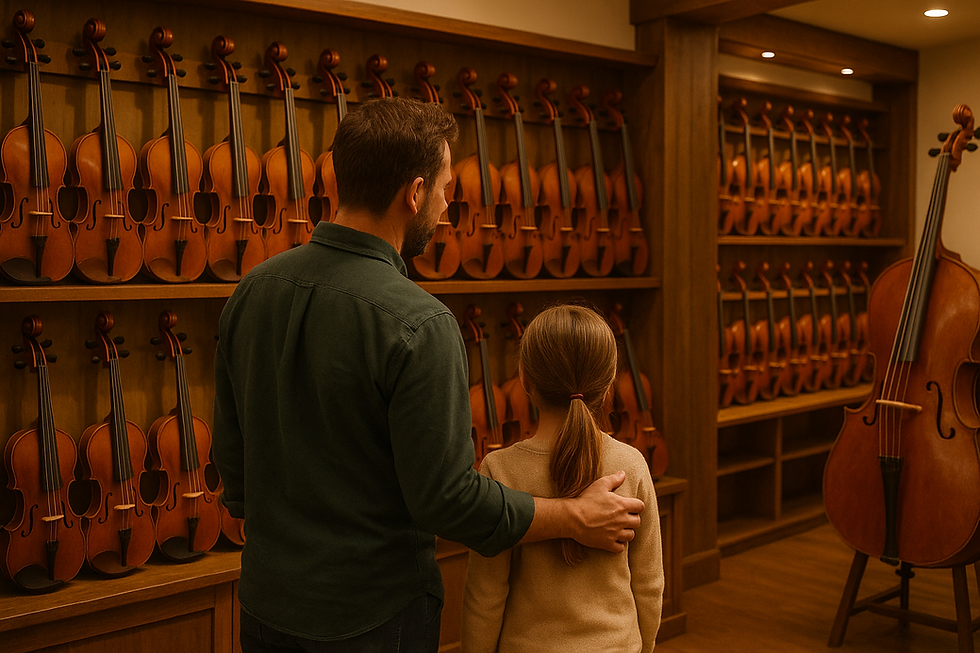🎻 Winter Humidity Tips for String Players
- Atelier for Fine Stringed Instruments

- Jan 5, 2025
- 3 min read
Updated: Jun 22, 2025

Is your violin feeling a bit under the weather this winter? You're not alone. As temperatures drop and heating systems kick in, string players face a silent threat to their instruments: dry air. With indoor humidity levels plummeting to as low as 10-20% during heating season, your beloved violin, viola, cello, or bass needs protection now more than ever.
Understanding the Winter Threat to Your Instrument
That expensive central heating keeping you cozy is doing your instrument no favors. While the ideal humidity range for string instruments is 40-60%, typical heated indoor environments can drop to desert-like conditions. This dramatic shift can cause both immediate and long-term damage to your instrument.
The Real Cost of Dry Air
Repair | Estimated Cost |
Minor seam separation repair | $75-$150 |
Crack repair | $300-$1,000+ |
Bridge replacement due to warping or breakage | $150-$300 |
Full restoration after severe damage | $1,000-$3,000+ |
Compare these repairs to the cost of prevention:
Preventive Measure | Cost |
Digital hygrometer | $25-$40 |
Boveda humidity control system | $15-$30 per season |
Dampit | $20-$30 |
Case humidifier | $30-$50 |
Warning Signs Your Instrument Is Too Dry
Pegs slipping or sticking unexpectedly
New buzzing sounds while playing
Open seams (visible gaps where wood pieces meet)
Changes in action (string height)
Loss of sound quality or projection
Your Winter Protection Plan
1. Monitor Humidity Levels
Start with a reliable digital hygrometer. (We have reliable digital units for only $15.99 at Atelier Fine Strings). Digital hygrometers provide accurate readings and often include helpful features like temperature monitoring and humidity history.
"The hygrometer in my case saved my viola from serious damage last winter. It alerted me to dangerous humidity drops before any damage occurred."— Sarah M., Principal Violist
2. Choose Your Humidity Solution
Different instruments and situations require different approaches:
For Violins and Violas
Boveda 49% packs (1-pack with carrier)
You may need to place one pack near the scroll and one near the bottom bout of your case
Replace every 3-4 months or when packs become rigid
For Cellos and Basses
Use a combination approach for best results:
Dampit inside the instrument through the f-holes
Case humidifier for additional protection
Check Dampit moisture levels every 3-4 days! Create a reminder on your calendar, (or ask Alexa to remind you!!!)
3. Seasonal Timing
Begin humidification when indoor heating starts (typically October).
Continue monitoring through spring (April-May).
Adjust based on local climate and heating patterns.
Common Humidification Problems and Solutions
1. My Dampit is Dripping
Gently wring out until no water drops appear.
Pat dry with a clean cloth.
Hold horizontally when inserting through f-holes.
2. Boveda Packs Feel Hard
Time to replace; hardness indicates the packs have released all their moisture.
Store unused packs in sealed plastic bags.
Consider using more packs during extremely dry periods.
3. Humidity Readings Vary Widely
Check the placement of your hygrometer inside the case.
Avoid placing it near case edges or zippers.
Recalibrate your hygrometer annually for accuracy.
Professional Help: When to Visit Atelier
Schedule a free check-up with us if you notice:
Open seams or cracks
Persistent buzzing sounds
A leaning or warped bridge
Significant peg problems
Our Expert Services Include:
Free winter care consultations
Professional humidity assessments
Same-day emergency seam repairs
Comprehensive crack restoration
Basic Winter Care Packages at Atelier Fine Strings
Basic Protection Kit ($75)
Digital hygrometer
4-month supply of Boveda packs
Installation guide & humidity consultation
Mid-winter check-up
Emergency repair discount
Visit atelierfinestrings.com or call us at 203.661.9500 to protect your instrument today.
Final Thoughts
An ounce of prevention is worth a pound of cure. The small investment in proper humidification can save you thousands in repairs and protect your instrument’s voice for generations to come.
Next in our Winter Care Series: Understanding Repair Services - When, Why, and How to Get Professional Help for Your String Instrument.



Comments